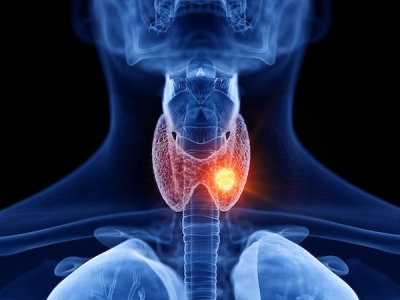Thyroid Gland - What is its function and how does its disorder manifest?
Author: Lucie Garabasova
The thyroid gland is a crucial organ responsible for managing many key functions within your body. In this article, we will explain its specific roles, explore potential thyroid disorders, and discuss how CBD can support proper thyroid care.
What is the Thyroid Gland and how does it work?
The thyroid is a small, butterfly-shaped gland located in the front of your neck, beneath the skin. It is part of your endocrine system and controls many important bodily functions by producing and releasing specific hormones.
Its primary role is to regulate your metabolism, the process by which your body converts food into energy. Every cell in your body requires energy to function effectively.
When the thyroid does not work properly, it can negatively impact the entire body. Did you know that CBD can help alleviate symptoms of thyroid disorders?
What is the Endocrine system?
The endocrine system consists of a network of glands that produce and secrete hormones.
A gland is an organ that produces substances like hormones, digestive juices, sweat, or tears. Endocrine glands release hormones directly into the bloodstream.
Hormones are chemical messengers that coordinate various functions in the body by transmitting signals through the blood to organs, skin, muscles, and other tissues. These signals instruct the body on what to do and when to do it.
The endocrine system includes the following organs and glands:
- Hypothalamus
- Pituitary gland
- Thyroid gland
- Parathyroid glands
- Adrenal glands
- Pineal gland
- Pancreas
- Ovaries
- Testes
Where is the Thyroid Gland located?
The thyroid gland is found at the front of the neck, below the trachea. It has a butterfly shape, with a narrow center and two wide wings extending along the sides of the neck. A healthy thyroid is usually not visible or palpable.
What Are the Parts of the Thyroid?
The thyroid has two main sections: two lobes and the thyroid isthmus, which connects the lobes.
The function of the Thyroid Gland
As an endocrine gland, the thyroid produces and secretes the following hormones:
- Thyroxine (T4): The primary hormone produced by the thyroid, crucial for regulating metabolism. It contains iodine.
- Triiodothyronine (T3): This hormone, like T4, regulates metabolism and energy balance. It is more biologically active than T4 and also contains iodine.
- Reverse Triiodothyronine (RT3): A byproduct of T4 conversion into T3, RT3 does not play an active role in metabolism and may have inhibitory effects on the thyroid.
The thyroid requires iodine, found in foods (such as iodized salt) and water, to produce its hormones.
Thyroid hormones affect the following functions:
- Metabolism
- Heart rate
- Breathing
- Digestion
- Body temperature
- Brain development
- Mental activity
- Skin and bone quality
- Fertility
The thyroid hormones influence nearly every organ in the body, including:
- Cardiovascular system: Regulating blood volume, heart rate, and contractility.
- Nervous system: Dysfunction can lead to numbness, tingling, pain, or burning sensations. Hypothyroidism may cause depression, while hyperthyroidism can trigger anxiety.
- Digestive system: Supporting gastrointestinal motility.
- Reproductive system: Dysfunction can lead to irregular menstruation and fertility issues.
Can you live without a Thyroid Gland?
Yes, it is possible to live without a thyroid gland. However, lifelong hormone replacement therapy is required to maintain health and prevent side effects. Thyroid removal surgery, known as a thyroidectomy, is a common procedure to treat certain thyroid conditions.
Common Thyroid disorders
Thyroid diseases affect women 5 to 8 times more often than men.
The four main thyroid diseases include:
Hypothyroidism (Underactive Thyroid)
This occurs when the thyroid gland does not produce and release enough thyroid hormones, leading to a slowed metabolism. It is a relatively common condition.
Causes of hypothyroidism include:
- Hashimoto's disease, an autoimmune disorder
- Thyroiditis (inflammation of the thyroid gland)
- Iodine deficiency
- Dysfunctional thyroid (when the thyroid does not function properly from birth)
Hyperthyroidism (Overactive Thyroid)
Hyperthyroidism occurs when the thyroid gland produces and releases more thyroid hormones than the body needs, speeding up certain aspects of your metabolism.
Causes of hyperthyroidism include:
- Graves' disease, an autoimmune disorder
- Thyroid nodules
- Thyroiditis (inflammation of the thyroid gland)
- Postpartum thyroiditis (inflammation of the thyroid gland after childbirth)
- Excess iodine in the blood from diet and/or medications
- Benign tumor in the pituitary gland
Thyroid Enlargement (Goiter)
This common condition has various causes depending on its type:
- Simple goiters: These occur when your thyroid does not produce enough hormones to meet the body's needs. The gland compensates by enlarging.
- Endemic goiters: These develop in people whose diets lack sufficient iodine, which is essential for thyroid hormone production.
- Sporadic goiters: Most sporadic goiters have no known cause. In some cases, medications like lithium may trigger their development.
Thyroid Cancer
Thyroid cancer begins in the tissues of the thyroid gland. Treatment for most thyroid cancer cases is highly successful.
Early warning signs of Thyroid issues
Symptoms to watch for include:
- Slow or rapid heart rate
- Unexplained weight gain or loss
- Sensitivity to cold or heat
- Depression or anxiety
- Irregular menstrual cycles
If you experience any of these symptoms, consult your doctor for a thyroid function test.
Thyroid examination
A blood test measures the level of thyroid-stimulating hormone (TSH). This is a screening test for both hypothyroidism and hyperthyroidism. Some private laboratories offer results within a few hours.
Generally, the normal range for a TSH blood test is 0.5 to 5.0 mIU/L (milli-international units per liter). However, this range may vary between laboratories and depending on certain factors, such as pregnancy and your age.
Your doctor may also check the levels of T4 and T3 (thyroid hormones) in your blood.
If test results are abnormal, your doctor might suggest imaging tests, such as a thyroid scan, which uses a small amount of safe radioactive material to create an image of the thyroid, or a thyroid ultrasound.
How are Thyroid disorders treated?
There are several treatment options for thyroid disorders depending on the type and severity of the condition. The three main treatment methods include:
Thyroid medications
- Antithyroid medications: These drugs block the thyroid's ability to produce hormones and are commonly prescribed for hyperthyroidism.
- Beta-blockers: These medications help manage symptoms of hyperthyroidism, such as rapid heart rate, but they do not treat the thyroid disorder itself.
- Radioactive iodine: This treatment damages thyroid cells, ultimately destroying the thyroid gland. It is used for treating hyperthyroidism and thyroid cancer.
- Thyroid hormone replacement medications: These synthetic hormones are used to treat hypothyroidism. People who undergo thyroidectomy or have a non-functioning thyroid after radioactive iodine treatment usually need to take these medications for life.
Surgery
The most common surgical procedure for thyroid disorders is thyroidectomy, the removal of the entire thyroid gland. Thyroidectomy is often the first-line treatment for thyroid cancer.
Another surgical option is lobectomy, which involves removing only part of the thyroid gland.
Radiotherapy and chemotherapy
Treatment options for thyroid cancer may include radiotherapy and/or chemotherapy. Both therapies aim to destroy cancerous cells and prevent their growth. However, most thyroid cancer cases do not require radiation or chemotherapy.
What are the risk factors for Thyroid disorders?
Thyroid disorders are common and can affect anyone at any age. However, certain factors increase the risk, such as:
- A family history of thyroid disease.
- Autoimmune conditions like type 1 diabetes, rheumatoid arthritis, or lupus.
- Use of medications with high iodine content.
Proper Thyroid care
The primary way to maintain a healthy thyroid is ensuring adequate iodine intake in your diet. The thyroid gland requires iodine to produce hormones. Fortunately, most people get sufficient iodine through iodized table salt and iodine-enriched foods.
Other food sources rich in iodine include:
- Cheese
- Cow’s milk
- Eggs
- Yogurt
- Seafood
- Shellfish
- Seaweed
- Soy milk
- Soy sauce
It’s important to avoid excessive iodine intake, as it may cause problems. If you have any questions or concerns about thyroid health, consult your doctor.
How does CBD affect the Thyroid?
CBD possesses antioxidant and anti-inflammatory properties that may benefit thyroid health.
Studies suggest that CBD oil may help regulate thyroid hormone levels and alleviate symptoms associated with some thyroid disorders. A 2015 study found significant concentrations of CB1 and CB2 cannabinoid receptors in the thyroid gland. However, no definitive studies have proven that CBD directly impacts thyroid function.
CBD interacts with the endocannabinoid system (ECS) – a complex network of specialized receptors located throughout the body that helps maintain homeostasis (balance). The ECS plays a role in regulating essential bodily functions, including appetite, mood, memory, fertility, body temperature, immune response, and pain perception.
When discussing how CBD may help alleviate symptoms associated with thyroid disorders, it can potentially address issues such as:
- Weight gain
- Inflammation
- Pain
- Skin problems
- Anxiety and depression
- Insomnia
- Fatigue
In general, CBD is also recommended for hormonal imbalances.
Moreover, CBD has very few side effects, making it a valuable addition to proper thyroid care.




